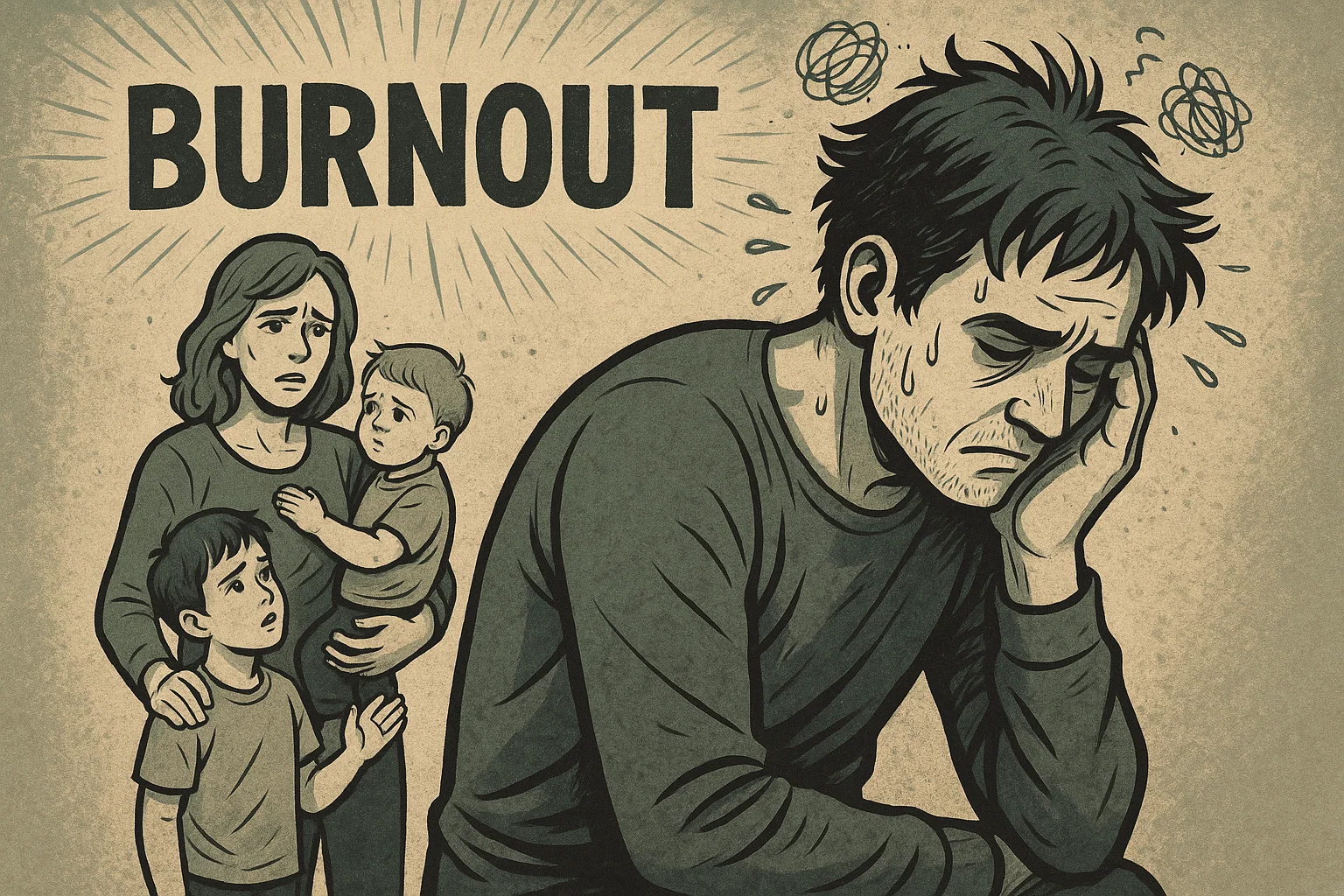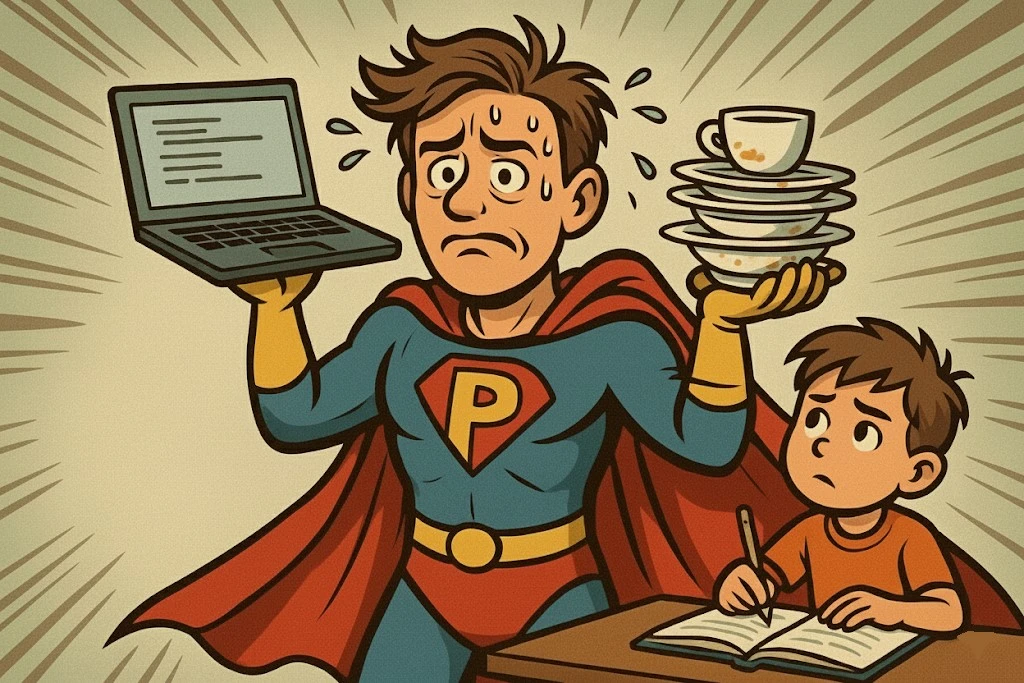Parenting is one of life’s most rewarding experiences, yet it can also be one of the most demanding. When the relentless pressures of raising children become overwhelming, parental burnout can emerge as a serious concern affecting millions of mothers and fathers worldwide. This comprehensive guide will help you understand, recognize, and address this increasingly common challenge that impacts family life in profound ways.
What is Parental Burnout?
Parental burnout represents a state of overwhelming exhaustion that extends far beyond typical parenting fatigue.
This condition manifests through three primary dimensions:
- Emotional exhaustion from constant caregiving demands
- Emotional distancing from children and the parenting role
- Reduced sense of parental accomplishment and effectiveness
Unlike job burnout, parent burnout occurs within the deeply personal context of caring for your own children, making it particularly complex and emotionally charged.
Understanding parental burnout vs. everyday stress 🤔
While all parents feel tired and stressed at times, parental burnout represents a more persistent and severe condition. Normal parenting stress typically resolves with rest or temporary relief, whereas burnout symptoms persist despite adequate sleep or brief breaks.
Every day parenting stress might involve:
- Occasional feelings of being overwhelmed
- Temporary irritability or impatience
- Short-term sleep disruption
- Manageable work-life balance challenges
Parental burnout, however, involves:
- Chronic stress that doesn’t improve with rest
- Persistent feelings of exhaustion lasting weeks or months
- Significant emotional distancing from children
- Thoughts of escape or regret about becoming a parent
Common causes of parental burnout
Several factors contribute to increased risk of burnout among parents today:
Societal and Cultural Pressures:
- The pursuit of being the perfect parent
- Social media comparisons and unrealistic expectations
- Lack of community support systems
- Perfectionism in parenting approaches
Personal and Family Factors:
- Insufficient emotional support from partners or family
- Financial stress affecting family life
- Single parenting or co-parenting challenges
- Child’s special needs or behavioral difficulties
Modern Lifestyle Demands:
- Balancing career and parenting responsibilities for working parents
- Limited time for self-care and personal interests
- Isolation from extended family and community networks
- Technology overwhelm and information overload
Parental Burnout Symptoms: How to Recognize Them

Symptoms can be both emotional and physical, ranging from constant irritability and guilt to chronic fatigue and sleep problems. It’s important to recognize these signs to take action in time.
Emotional and mental parental burnout symptoms 😰
Parents experience exhaustion differently, but emotional symptoms often appear first and can be the most distressing:
Emotional Indicators:
- Persistent irritability or anger toward children
- Feelings of exhaustion that don’t improve with rest
- Sense of being trapped or overwhelmed by parenting duties
- Loss of joy or satisfaction in interactions with children
- Emotional distancing as a protective mechanism
Mental Health Symptoms:
- Difficulty concentrating or making decisions
- Memory problems related to parenting tasks
- Intrusive thoughts about escaping or running away
- Depression or anxiety specifically related to parenting
- In severe cases, suicidal thoughts or ideation
Research published on BMC indicates that parents with exhaustion are three times more likely to develop mental health issues compared to those without exhaustion symptoms.
Physical and behavioral signs
Parental burnout manifests through numerous physical and emotional symptoms that impact daily functioning:
| Physical Symptoms | Behavioral Changes |
| Chronic fatigue despite adequate sleep | Increased yelling or harsh discipline |
| Frequent headaches or muscle tension | Avoiding family activities or interactions |
| Digestive issues or appetite changes | Neglecting household responsibilities |
| Weakened immune system | Substance use as coping mechanism |
| Sleep disturbances or insomnia | Social withdrawal from friends/family |
Parents often report feeling like they’re going through the motions of parenting without genuine engagement or emotional connection with their children.
How recognizing parental burnout can lead to early intervention
Early recognition of parental burnout symptoms enables more effective intervention and prevents escalation to more severe consequences. It’s important to understand that recognizing parental burnout isn’t about admitting failure—it’s about taking proactive steps to protect both parental well-being and child development.
Warning signs that suggest immediate attention is needed:
- Persistent thoughts of harm to self or children
- Complete emotional distancing from family relationships
- Inability to function in basic parenting tasks
- Substance use as primary coping strategy
- Depressive episodes lasting more than two weeks
Strategies for Overcoming and Preventing Parental Burnout

Simple but effective strategies can help you overcome and prevent burnout: make time for yourself, manage your expectations, and don’t be afraid to ask for help. Self-care is a necessity, not a luxury.
The importance of self-care ✨
Self-care isn’t selfish—it’s essential for effective parenting. Many parents struggle with guilt around prioritizing their own needs, yet research posted on Springer shows that parental well-being directly impacts child development and family dynamics.
Effective Self-Care Strategies:
Daily Micro-Practices:
- 5-10 minutes of deep breathing or meditation
- Brief walks outside, even with children
- Listening to favorite music while doing routine tasks
- Practicing self-compassion through positive self-talk
Weekly Commitments:
- Scheduling regular time for personal interests
- Maintaining friendships and social connections
- Engaging in physical exercise or movement
- Setting boundaries around work and family time
Monthly Recharge Activities:
- Planning solo time away from children
- Pursuing hobbies or creative outlets
- Connecting with other parents for support
- Evaluating and adjusting family routines
Tips for managing stress and workload
Preventing parental exhaustion requires systematic approaches to managing the demands of parenting alongside other life responsibilities.
Practical Stress Management:
- Prioritize essential tasks and let go of perfectionist standards
- Create realistic daily and weekly schedules
- Ask for help from family, friends, or community resources
- Delegate age-appropriate responsibilities to children
- Use technology mindfully to support rather than overwhelm
For Working Parents:
- Negotiate flexible work arrangements when possible
- Set clear boundaries between work and family time
- Utilize employer benefits like Employee Assistance Programs
- Consider childcare options that reduce daily stress
Workload Distribution:
- Share household and childcare duties equitably with partners
- Involve extended family in regular childcare support
- Join or create parent co-ops for mutual assistance
- Hire help when financially feasible
How to manage parental expectations and guilt 💭
Perfectionism in parenting contributes significantly to exhaustion development. Learning to manage parental expectations involves recognizing that “good enough” parenting often produces healthier outcomes than perfectionist approaches.
Expectation Management Strategies:
Cognitive Reframing:
- Challenge thoughts about being the perfect parent
- Focus on progress rather than perfection
- Recognize that children benefit from seeing parents as human
- Understand that mistakes are learning opportunities
Guilt Reduction Techniques:
- Practice self-compassion when facing parenting challenges
- Remember that you’re not alone in struggling with parenting
- Seek perspective from other experienced parents
- Focus on long-term relationship quality over daily perfection
Realistic Goal Setting:
- Set achievable daily and weekly parenting goals
- Celebrate small victories and positive interactions
- Adjust expectations based on family circumstances
- Remember that aspects of parenting evolve as children grow
When to Seek Professional Help

If symptoms persist and interfere with your daily life, it’s time to seek professional help.
Knowing when seeking professional help is necessary 🆘
While self-help strategies can be effective for mild to moderate parental stress, certain situations warrant professional support. Seeking professional help demonstrates strength and commitment to family well-being rather than personal failure.
Clear Indicators for Professional Support:
Immediate Intervention Needed:
- Thoughts of harming yourself or your children
- Suicidal ideation or planning
- Complete inability to care for children
- Substance use as primary coping mechanism
- Severe depression or anxiety affecting daily functioning
Professional Consultation Recommended:
- Symptoms of exhaustion persisting longer than 4-6 weeks
- Significant impact on marital or family relationships
- Inability to enjoy any aspects of parenting
- Physical and emotional symptoms affecting work performance
- Children showing signs of distress related to parental behavior
Types of professional help available
Multiple professional help options exist to address parental burnout from various angles:
Mental Health Professionals:
- Licensed therapists specializing in parental stress
- Family counselors for relationship and parenting issues
- Psychiatrists for medication evaluation when needed
- Support groups led by mental health professionals
Specialized Services:
- Parent support programs through community centers
- Postpartum support specialists for new parents
- Family coaches focusing on parenting skills development
- Online therapy platforms offering flexible scheduling
Medical Support:
- Primary care physicians for physical symptom evaluation
- Sleep specialists for persistent sleep disturbances
- Nutritionists for stress-related eating concerns
- Integrative medicine practitioners for holistic approaches
The benefits of therapy for parenting burnout
Therapy provides structured support for parents experience burnout while developing sustainable coping strategies.
Therapeutic Benefits:
Individual Therapy:
- Processing guilt, shame, and perfectionist tendencies
- Developing personalized self-care strategies
- Learning stress management and emotional regulation skills
- Addressing underlying mental health issues
Family Therapy:
- Improving communication patterns within the family
- Redistributing household and childcare responsibilities
- Addressing children’s responses to parental stress
- Strengthening family bonds and connection
Group Therapy:
- Connecting with other parents facing similar challenges
- Reducing isolation and normalizing burnout experiences
- Learning from others’ coping strategies and successes
- Building ongoing emotional support networks


